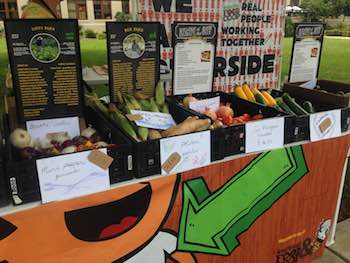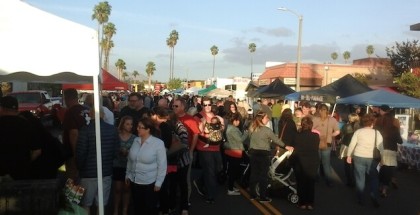For Riverside, CA Food Co-op ‘Local is Micro-local’
May 31, 2016 | AJ Hughes

Al Centro mini produce stand, operated by the Riverside Food Co-op, provides locally-grown fruits and vegetables to Riverside residents. (photo courtesy Alannah Leblanc/Riverside Food Co-op)
The most important word for the Riverside Food Co-op (RFC) is “local.” Its definition can be broad, but for Nick Melquiades, RFC core team operations manager, “local” has a very specific meaning.
“For us, local is micro-local,” Melquiades says. “Ninety-five percent of our produce comes from within 25 miles of downtown Riverside.”
The RFC formed in 2011 in response to the recession in Riverside, has eventual plans to open a store. Not having a physical retail location to sell local produce, however, has not prevented it from playing an outsize role in local food system development in the City of Riverside.
Its core efforts currently include participating in Kaiser Permanente-sponsored Eastside HEAL Zone initiatives; increasing the amount of locally-grown food sourced by retail establishments; and providing food via its Crop Box local food subscription program.
Eastside Heal Zone initiatives
The RFC works with Riverside’s Eastside HEAL Zone through two healthy food efforts—Weekly Harvest and Al Centro produce stand.
Weekly Harvest, which the Co-op began in September 2015, offers 10 weekly sessions during which participants learn about healthy eating and receive a container of locally-grown produce. Workshops are led by nutrition educators, Master Preservers and Master Gardeners.
Al Centro began in 2015 and is just one of the ways in which the Co-op makes local food available to Riverside residents.
“Al Centro is our produce stand—located on University Avenue, it helps activate the community to understand about local foods and why its flavor is so different,” says Co-op core team operations manager Nick Melquiades. “Al Centro is building local clientele, and does work with the corner store across the street which sells locally through HEAL Zone initiatives.”
The RFC’s work with HEAL Zone and Al Centro, both limited engagements with initial runs from August/September to March, was made possible from a $40,000 grant. Melquiades is pleased with the results.
“It was well-received, and was a commitment to build an audience for our message,” he says. “It’s all about what GrowRIVERSIDE entails.”
According to Melquiades, Al Centro is thriving as a popular produce stand, and the Co-op just embarked on phase 2 in its partnership with the Kaiser Permanente Eastside HEAL Zone initiative.
“Now we’re a HEAL Zone partner,” he says. “We have a longer-term commitment, and can develop our message even further.”
Growing the local food marketplace in Riverside
Infrastructure enhancements have helped RFC to ramp up its local food distribution and sourcing efforts. Fox Farm in Riverside, one of the Co-op’s partners, makes available to Co-op outlets the use of its cold-storage facility. In effect, this centralized cold-storage unit allows the RFC to function as a small-scale distribution center, or food hub.
“It’s a cooler where other farms bring their produce for distribution,” says Melquiades. “It’s a way to build capacity. Our goal is to have a larger distribution center.”
And the key for widespread distribution is having a wide variety of places for produce to go so farmers can make money.
“Retail is a broad issue for the entire food system,” Melquiades says. “It’s a general concern for all of us.”
For an organization like the Riverside Food Co-op, the key is not only sourcing local, but selling local. Currently larger grocery stores are not viable options.
“It’s hard to penetrate those markets (large grocery chains) because pricing is so competitive,” says Melquiades.
So for now and the foreseeable future, the Co-op keeps focusing on selling locally and educating people about the importance of local agricultural production. Fox Farm’s Scott Berndt, who’s part of the Co-op, sells produce to Riverside Unified School District and several area restaurants. The Co-op aims for expansion to markets such as these.
Latinos also represent a receptive audience for the Co-op’s message, according to Melquiades.
“Latino communities appreciate old-fashioned ways of growing food—that resonates with them.”
The Crop Box
Those who don’t have time to make special trips to Al Centro or take advantage of other Co-op offerings may take advantage of Crop Box, a subscription-based service that provides a monthly container of locally-grown goodies. This service, which is only available to Co-op members, costs $27 per month.
“This has really been well-received,” says Melquiades. “It’s a monthly opportunity to connect with members.”
Ultimately, Melquaides says continuing to get the word out about the health and economic benefits of local produce is important for the Co-op’s sustained success.
“The challenge is to convey that message,” he says.












Submit a Comment